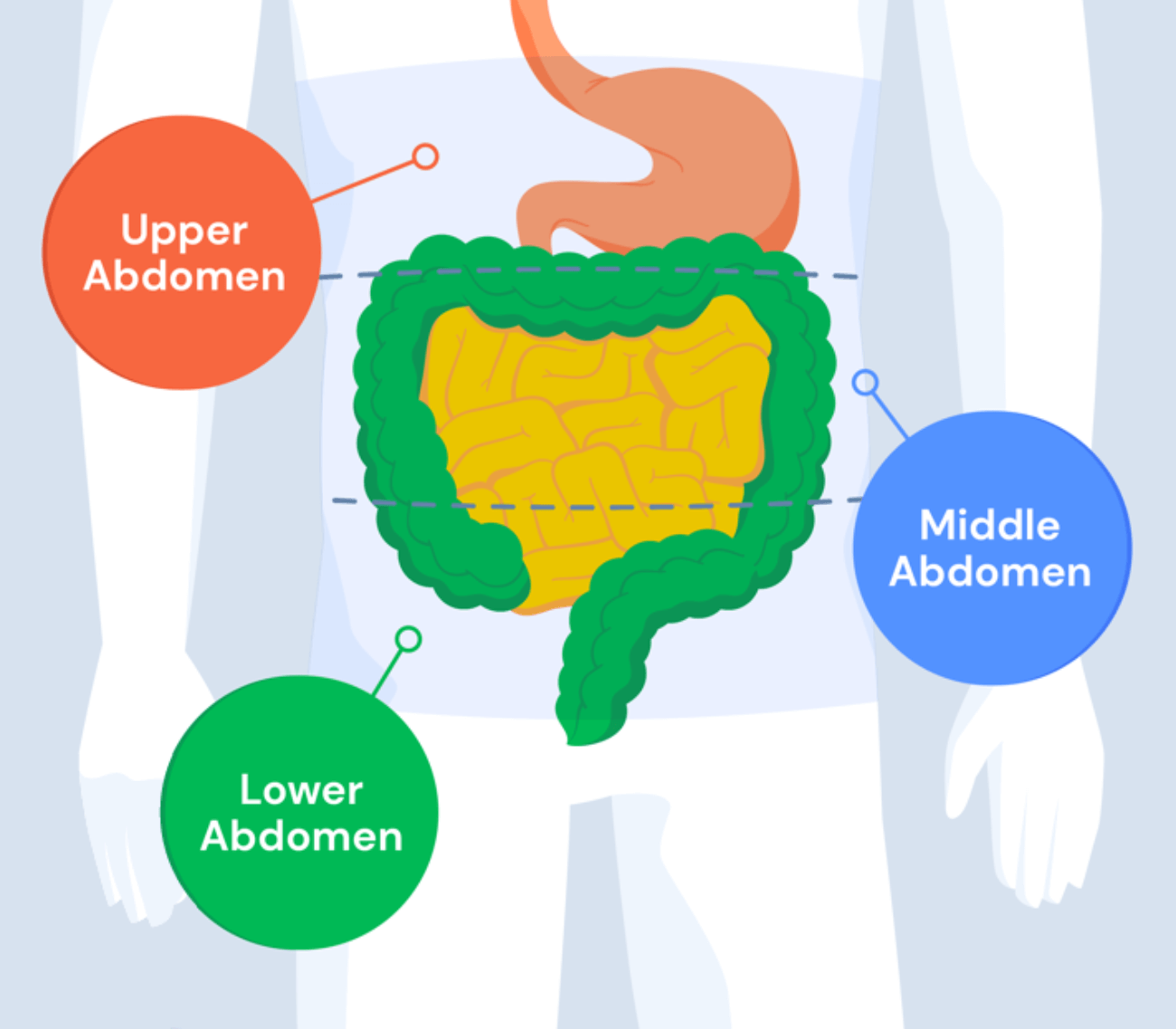Understanding abdominal pain
You're on your way home. Suddenly, you feel cramping in your stomach but you don't know if it's from food, stress, work or something else. Pain can have many different causes, so determining the root of the pain is important to be able to treat it correctly.

Types of pain
What does your pain feel like?
Abdominal pain is a special kind of pain that's different from a headache or indigestion and requires a specific treatment. It varies depending on intensity, duration, or location, and differs in how it feels (knots, cramps). Listening to your body will help you understand your pain.
Cramps or spasms.
Gas, stress or emotions can produce this pain, which can become intense and attack by surprise.
Generalized
This pain is felt in more than half of the abdomen and therefore can be linked to various causes.
Localized
The pain is felt in a specific area of the abdomen and may be an indication of a problem in a particular organ.
Pain area
Where does it hurt?
Belly pain can surprise you at any time of the day. To better understand it, it's important to identify where it's located and if the pain extends to other areas because this can help your doctor determine its possible causes.

Recurrence
How often do you feel abdominal pain?
Suffering from abdominal pain and discomfort should not be normalized nor should it affect your daily activities, regardless of its intensity.
The frequency of your cramps can be an indicator that something else, like IBS, could be causing it. If you feel frequent, persistent pain or pain that intensifies over time, see your doctor. If you feel pain that is severe and unexplained, seek medical attention immediately, as this may be a sign of a more serious condition.
Causes of pain
What causes stomach pain?
There can be many causes of stomach pain. The organs of the abdomen are very sensitive to internal and external influences.
On a daily basis, here are some of the most common:
Relieving your stomach pain
It is important to use the right treatment for the right symptom.
Antispasmodics
An antispasmodic helps relax the muscles in your belly, and is a treatment option indicated for relieving abdominal cramps and discomfort.
Analgesics
These are medications that can reduce or alleviate pain by cutting off the signals sent to your brain. Analgesics are used for pain such as headaches and toothaches.
Antacids
These medications work by neutralizing gastric acid in the stomach, reducing the effects of heartburn.
Treatment
Buscopan®, your ally against abdominal cramps, pain and discomfort
Learn more
Understanding abdominal pain
-
Sensitivity to certain foods that trigger stomach pain, such as fatty, fried, or spicy foods; caffeinated, alcoholic, or carbonated drinks; and dietary intolerances, such as lactose intolerance. Eating too fast, not taking the time to chew, or skipping meals, as well as stressful situations and anxiety may also cause stomach pain.
-
If you feel frequent, persistent pain or pain that intensifies over time, see your doctor. If you feel pain that is severe and unexplained, seek medical attention immediately, as this may be a sign of a more serious condition.
-
Abdominal cramps are caused by sudden, strong tightening of the smooth muscles in the gut. Buscopan® is an antispasmodic medication that offers targeted relief of abdominal cramps, pain and discomfort in the stomach and gut (intestines and bowel) by relaxing the tight muscles – it acts where the pain develops, in the abdomen.
-
To reduce pain while at home, try taking a hot bath or placing a warm compress on your belly, drinking plenty of fluids, and getting some rest.
-
To establish the causes of your belly pain, the doctor may do a physical exam and ask you specific questions about the location, type and intensity of the pain, as well as your medical history. Your doctor could also request that you undergo additional tests. If you suffer frequently from abdominal pain or cramping, review this symptom checklist to help you and your doctor choose a treatment option that best suits your needs.
-
Pain in the belly caused by eating habits, stressful situations or life changes can be avoided with practices such as following a balanced diet or managing stress.
Common Gastrointestinal Problems: A Consumer Health Guide: Abdominal Pain. Maryland: American College of Gastroenterology [quoted May 15, 2020].
Harvard Health Publishing [Internet]. Cambridge: Harvard Medical School [updated May 2015; cited May 14, 2020]. Recurring Abdominal Pain in Adults. https://www.health.harvard.edu/decision_guide/recurring-abdominal-pain-in-adults
Harvard Health Publishing [Internet]. Cambridge: Harvard Medical School [updated August 2010]. Stress and the sensitive gut. https://www.health.harvard.edu/newsletter_article/stress-and-the-sensitive-gut
Health Cleveland Clinic [Internet]. Cleveland: Cleveland Clinic [updated Dec 06, 2019; cited May 14, 2020]. What's Causing Your Lower Abdominal Pain? https://health.clevelandclinic.org/whats-causing-your-lower-abdominal-pain/
Mayo Clinic [Internet]. Rochester: Mayo Clinic [updated 13 Sep 2019; cited 7 May 2020]. Indigestion. https://www.mayoclinic.org/diseases-conditions/indigestion/symptoms-causes/syc-20352211
Mayo Clinic [Internet]. Rochester: Mayo Clinic [updated Mar 17, 2018; cited May 14, 2020]. Irritable bowel syndrome. https://www.mayoclinic.org/diseases-conditions/irritable-bowel-syndrome/symptoms-causes/syc-20360016
Mayo Clinic [Internet]. Rochester: Mayo Clinic [updated Apr 25, 2019; cited May 18, 2020]. Abdominal pain. https://www.mayoclinic.org/symptoms/abdominal-pain/basics/definition/sym-20050728
MedlinePlus [Internet]. Bethesda: U.S. National Library of Medicine [updated 09 Apr 2020; cited 14 May 2020]. Abdominal pain. https://medlineplus.gov/ency/article/003120.htm
MedlinePlus [Internet]. Bethesda: U.S. National Library of Medicine [updated Jul 02, 2020; cited Jul 16, 2020]. Gastritis https://medlineplus.gov/ency/article/001150.htm
Sanofi Consumer Healthcare Inc. (2021). Prescribing information and patient medication information
*Buscopan® is a substance that blocks the effect of acetylcholine (neurotransmitter). Side affects are generally mild and limited.

